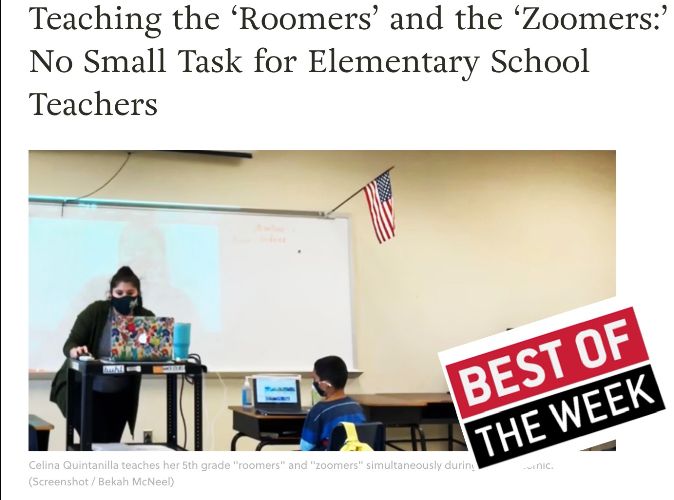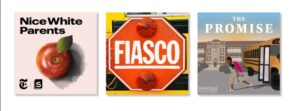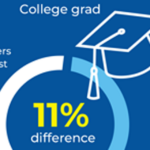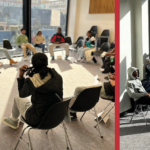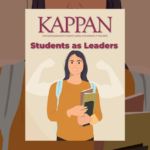|
|
| BEST OF THE WEEKThe week’s best education journalism, all in one place. |
|
| 🏆 BEST: In Teaching the ‘Roomers’ and the ‘Zoomers:’ No Small Task for Elementary School Teachers, The 74’s Bekah McNeel goes inside the classroom to see how teachers balance the needs of in-person and remote learners. She describes firsthand the challenges of trying to connect with students amid the challenges of inequity and special needs and very different, austere classrooms. This piece gives readers a realistic understanding of what teachers are experiencing and brings something unusual to the journalistic record.🏆 RUNNER-UP: Can majority-white teachers unions become anti-racist? Not easily, according to this story in The 74 from a few days ago. In it, editorial fellow Asher Lehrer-Small tells the story of Providence teachers’ slow progress and a mostly white racial justice committee created in the aftermath of the police killing of George Floyd. It’s an important topic to explore and generally well done. While many unions have adopted social justice language, I’d love to see more coverage of their actual efforts and accomplishments.
BIG STORY OF THE WEEK: CHALLENGES AND INNOVATIONS OF REMOTE LEARNING
As students across the country face a third semester of remote learning, the consequences of being out of the classroom keep piling up — as do the attempted solutions.
CHALLENGES:
🏆 Surge of research reveals students sliding backward, most vulnerable worst affected (WaPo)
🏆 As students struggle with remote learning, teachers grapple with Fs (Chalkbeat)
🏆 Schools confront ‘off the rails’ numbers of failing grades (AP)
🏆 For many teachers, distance learning is a constant fight to get students to engage (San Diego Union-Tribune)
🏆 With More Than 110,000 NYC Students Homeless, Many Are Struggling to Learn (NY1)
🏆 Pandemic renews focus on student mental health (The Nevada Independent)
🏆 The number of failing Salt Lake City middle and high school students has skyrocketed as all attend classes online (Salt Lake Tribune)
SOLUTIONS:
🏆 Can 17 Second Graders And Their Teacher Make Up What The Pandemic Took Away? (WBEZ Chicago)
🏆 Night school comes to the rescue for some kindergarteners and their parents (CNN)
🏆 Lesson To Learn From Germany In Providing Education During The Pandemic (NPR)
🏆 Brave new world: Students from immigrant families in Philadelphia give inside view on adjustment to remote learning (Chalkbeat Philadelphia)
🏆 Evidence of learning loss is piling up. Here’s how the U.S. could design a tutoring program to help. (Chalkbeat) |
|
| USA TODAY’S EDUCATION POWERHOUSE; HOW EUROPE KEEPS SCHOOLS OPEN; AND UNUSUALLY NEGATIVE COVID COVERAGE |
|
| Over the past two and a half years, USA Today education editor Chrissie Thompson has spun up a powerhouse education operation. In a new interview, Thompson told me how she pulled it off, despite the pandemic and shifts in foundation funding, and how USA Today’s coverage distinguishes itself. “We need to have those signpost stories because we are ‘the nation’s newspaper,’ ” Thompson said. “But we also want to find nuance and angles and trends that our other colleagues in the field haven’t tackled yet.”How are European nations keeping schools open without generating enormous resistance from teachers and reluctance from parents? One key, according to contributor Anthony LaMesa, is extra money to hire more staff.
Earlier this week, I wrote about a new report that found that the largest U.S. media outlets have produced unusually negative coverage of reopening schools when compared to other kinds of outlets. Has the focus on risks and setbacks affected district policies? Read the column, or read the report: Why Is All COVID-19 News Bad News?
Want education news and commentary all day, every day? Follow @thegrade_ for daily news clips and @alexanderrusso for commentary. |
|
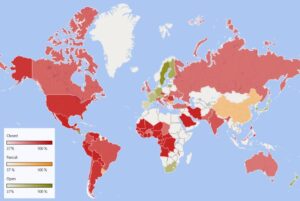 |
| MEDIA TIDBITSThought-provoking commentary on the latest coverage. |
|
| Above: There’s a new study out on school closures worldwide, showing widening disparities and “chaotic reopening unrelated to cases/deaths,” according to researcher Alasdair Munro. There’s also a Swiss-based nonprofit called Insights For Education that NPR, BuzzFeed, Reuters, and other news outlets have used. Maybe some good information in there for you?📰 ED SEC COVERAGE MIA: As of Friday morning, we still don’t know who the Ed Sec nominee is going to be. More important, we don’t know much of anything about the internal tensions and dynamics surrounding the selection process. Former NEA president Lily Eskelsen García seems like a front-runner and has generated the most coverage. MSNBC’s Chris Hayes asked Eskelsen García hard questions but made little effort to knock down her pat answers. Politico covered LEG’s full-on campaign to win the appointment. The 74’s Mike Antonucci took a look back at her quick rise to union leadership in Utah.
📰 KNOCKING DOWN BAD INFORMATION: Kudos to the Salem Reporter’s Rachel Alexander and the Washington Post’s Perry Stein and Moriah Balingit, who took to Twitter and elsewhere to knock down CDC data that seemed to suggest COVID case transmission in classrooms. That’s not what the CDC data actually said, though it was an easy mistake for people to make. (I also want to acknowledge Balingit’s bravery in sharing her experience of being sexually harassed by the head of the newsroom union when she was a 22 year old reporter in Pittsburgh. Thank you for sharing your story, Moriah.)
📰 PARENTS VERSUS TEACHERS: There’s been a surge of coverage featuring administrators’ and parents’ efforts to pressure school districts to reopen schools — often against the wishes of teachers — but not nearly as much as would seem warranted or has been generated in the past. Teacher protests generate coverage that’s almost automatic. Past parent protests against things like standardized testing have also generated massive coverage. Why not now? Feelings are high, as this recent viral clip of a desperately angry teacher attests. There’s a rich, complex story to be told. I hope more people will consider covering it.
📰 BLAMING REOPENED SCHOOLS: I’m squarely in favor of reopening schools as quickly as possible, so you may not be surprised to know that I objected to the New York Times’ recent piece that emphasized the disproportionately low number of Black parents who’ve chosen part-time in-person instruction for their children in NYC. The real problem isn’t that Black kids are underrepresented in hybrid, it’s that they’re overrepresented in remote — and that more parents don’t have an option to change their minds.
📰 NICE WHITE MEDIA CRITICS (LIKE ME): Last Friday, The Objective’s Gabe Schneider wrote an amazing piece about the overwhelming whiteness of media criticism and reporting, which was also published in Poynter. As a white guy who’s wearing a plaid shirt in his Twitter picture, I am part of the problem. The Grade has published a lot of pieces by journalists of color and regularly addresses race, gender, and class issues, but there’s still more we can and will do in 2021.
Missed some previous editions? You can see the archive of past newsletters here. |
|
 |
PEOPLE, AWARDS
Who’s going where & doing what? |
|
| Above: Report for America announced the 60 newsroom partners for its 2021 cohort, including lots of new positions for education and related beats. RFA’s impact on education coverage was examined by contributor Colleen Connolly earlier this year. RFA member Sara Cline wrote an important national overview on parent protests for AP last weekend.🔥 Jobs: Chalkbeat is looking for a bunch of interns, an editor in chief, a visuals coordinator, and a Tennessee bureau chief to replace Jacinthia Jones, who left to work at St. Jude Children’s Hospital as a content manager. In what may be the biggest job out there, EdSource is looking for an executive editor to replace Louis Freedberg, who’s stepping down to do more writing.
🔥 Applause: Mississippi Today’s Anna Wolfe was a winner of the National Press Foundation’s 2020 Poverty and Inequality Awards. Her work “captured the unprecedented challenges of COVID-19 for the schoolchildren of Jackson, Mississippi.” A piece about Sandy Hook by the Washington Post’s John Woodrow Cox was named to Longreads’ Best of 2020 stories. Education correspondent Adolfo Guzman-Lopez celebrated his 20th anniversary at KPCC on Dec. 8. Chalkbeat’s Aaricka Washington marked her second Time Magazine piece’s appearance in its latest special issue. And the Dallas Morning News Ed Lab got a shoutout in Editor and Publisher. Congrats to all!
Did someone forward you this newsletter? You can sign up here. |
|
EVENTS
What just happened & what’s coming next? |
|
| Above: Nice White Parents made the list of best podcasts of 2020 from New York Magazine and the New Yorker, along with two other education-related podcasts “Fiasco: The Battle for Boston” and “The Promise.”⏰ Did you hear? Actor and comedian Issa Rae is adapting Serial’s “Nice White Parents” podcast as a comedy series for HBO. Earlier this year, I interviewed podcast creator Chana Joffe-Walt about how she reported and structured the series. Who’s going to play her on HBO, I wonder? Maggie Gyllenhaal comes to mind. You may have better ideas.
⏰ It was nice to hear Chalkbeat national education reporter Kalyn Belsha on WNYC’s The Takeaway talking about how to help students falling behind during the pandemic.
⏰ Ed Labs are everywhere: The Boston Globe started a new series in their Great Divide newsletter showcasing student art, essays, and more and hosted an event Thursday on what’s working and what’s not in virtual learning. Fresno Bee Ed Lab engagement editor Isabel Sophia Dieppa hosted a listening session with teachers and parents about remote learning Wednesday and Thursday and will host another next week. It also just launched a new series called “The Pipeline” on student mental health and policing.
⏰ Upcoming awards: The Poverty and Inequality 2020-2021 Awards are accepting entries until Jan. 15, and one prize will be awarded for a story about children in poverty. And send in your submissions by Feb. 28 for the Texas Observer’s 2021 Molly National Journalism Prizes for investigative journalism and political commentary. Chalkbeat Indiana’s Aaricka Washington will be one of the judges. |
|
| “It looks like Education Week updated their site, and it’s sexier than Mickey Rourke in 1982,” tweeted The 74’s Kevin Mahnken.For purposes of comparison, that’s the snazzy new EdWeek site on the left, and 1980s Mickey Rourke on the right. |
|
| By Alexander Russo with additional writing from Michele Jacques and Colleen Connolly. |
|
| That’s all, folks. Thanks for reading! |
|
|
|
|
|
|



